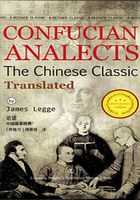
CHAPTER 20
The Master said, "The Kwan Ts'eu is expressive of enjoyment without being licentious, and of grief without being hurtfully excessive."
17. HOW CONFUCIUS CLEAVED TO ANCIENT EITES. 1. The emperor in the last month of the year gave out to the princes a calendar for the 1st days of the 12 months of the year ensuing. This was kept in their ancestral temples, and on the 1st of every month, they offered a sheep and announced the day, requesting sanction for the duties of the month. This idea of requesting sanction is indicated by 告, read kuh, up.4th tone. The dukes of Loo neglected now their part of this ceremony, but the sheep was still offered:—a meaningless formality, it seemed to Taze-kung. Conf. however, thought that while any part of the cer. was retained, there was a better chance of restor. the whole. 去, up.3d tone, an act. verb. 'to put away'. It is disputed whether 气, in the text, mean a living sheep, or a sheep killed but not roasted. 2. 爱, in the sense of 爱惜, 'to grudge', it is said. But this is hardly necessary.
18. HOW PRINCES SHOULD BE SERVED:—AGAINST THE SPIRIT OF THE TIMES.
19. THE GUIDING PRINCIPLES IN THE RELATION OF PRINCE AND MINISTER. 定, 'Greatly anxious, tranquillizer of the people', was the posthumous epithet of 宋, prince of Loo, B.C. 508-494. 如之何, 'As it what', 之referring to the two points inquired about.
20. THE PRAISE OF THE FIRST OF THE ODES.关雎 is the name of the first ode in the She-king, and may be translated.—'the murmuring of the ts'eu'. See She-king, L.i.1.
